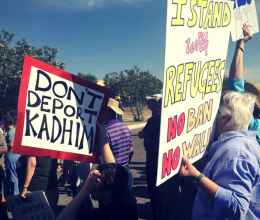Originally published in the Summer 2017 issue of The Torch
He kissed his wife of thirteen years gently. Then, Immigration and Customs Enforcement escorted him out the door. Though they told him they were just taking him in for questioning, Abbas Oda Manshad Al-Sokaini knew he wouldn’t be coming back.
The morning of June 20, when federal agents startled him out his sleep with loud banging on the windows and doors, was the last time Abbas woke up in his Albuquerque home. Since then, he’s seen his family only from the confines of a detention center in El Paso, Texas.
The morning of June 20, when federal agents startled him out his sleep with loud banging on the windows and doors, was the last time Abbas woke up in his Albuquerque home
Abbas came to the United States from Iraq as a political refugee in the 90’s after facing torture by Saddam Hussein’s regime. As an Iraqi soldier, he collaborated with American troops by providing information about the location of the government’s weapons and ammunition caches.
He’s lived peacefully in Albuquerque with his wife, three stepchildren, eleven grandchildren, and five great-grandchildren, all of whom are U.S. citizens, for decades. But under the new administration, Immigration and Customs Enforcement (ICE) decided that a non-violent drug conviction from seventeen years ago warranted his deportation. If sent back to Iraq, his family fears he will face persecution, torture, or worse.

“Abbas is the backbone of our family,” said Brenda Sisneros, Abbas’ wife. “He has deep roots here in Albuquerque, and we want him to come back home. He made a mistake many years ago, but everyone’s human. People in Iraq know he’s involved in my church, and he could face violence if they make him go back. I don’t want my family to lose him.”
Abbas is not alone. In early June, ICE agents conducted a series of mass raids rounding up more than one hundred Iraqis who had some sort of criminal conviction on their record, often only misdemeanors incurred decades ago. Although these past infractions made them removable under federal immigration law, the United States lacked a repatriation agreement with Iraq, which made deportation impossible. Instead, they maintained regular check-ins with ICE and the overwhelming majority lived peaceably in their communities with their families. Overnight all of that changed.
In March, Trump’s administration struck a deal in which Iraq agreed to accept Iraqi nationals with final orders of deportation back into the country. In exchange, Trump agreed to remove Iraq from his anti-Muslim travel ban list. Suddenly, more than 1,400 Iraqi nationals—most of whom came to the United States as refugees—were in danger of deportation. Due to religious minority status or prior collaboration with the U.S. armed forces, a return to Iraq would be tantamount to a death sentence for many.
Kadhim Albummohamed understands these consequences all too well. Like his friend Abbas, Kadhim is a longtime resident of Albuquerque and assisted the United States Military during the First Iraq War. After suffering torture and persecution at the hands of Saddam’s henchmen, he fled Iraq and settled in the United States as a refugee. When the U.S. invaded Iraq again in 2003, he worked several years for the U.S. Military training troops with crucial linguistic and cultural skills in preparation for deployment. Because of his service to the U.S. Military, he is certain he will face torture or death if he is deported to Iraq.
“If they send me back, I will be killed,” said Kadhim. “One hundred percent.”
“If they send me back, I will be killed,” said Kadhim. “One hundred percent.”
Because of two misdemeanor convictions twenty-one years ago, Kadhim, a chronically ill 61-year-old father of four U.S. citizen children, has suddenly jumped to the top of ICE’s list. ICE agents began tailing him, even to appointments with his immigration attorney, and Kadhim feared that any day his family could be frightened from their sleep by pounding at the door.
To spare his wife and daughter from seeing him dragged away by ICE, he took precautions. Kadhim packed his bags and sought refuge with a local faith community, living and sleeping in their sanctuary. Not long after, ICE sent him a letter ordering him to report to the local field office on June 26. His attorney advised him that at this appointment ICE would likely take him into custody and place him in immigration detention.

“I’m scared because if he does go, will I ever contact him, will I ever get to call him again,” asked his seventeen-year-old daughter, Courtney, as tears ran down her face. “It’s hard because what is the last thing you’re going to say to your dad when you know it’s going to be the last time you’re going to see him? I don’t know what I’m going to say. I don’t want to have to think about that because he’s my best friend and I don’t want him to leave.”
Kadhim reported for his meeting with federal agents that morning—and so did more than a hundred protesters. Word had spread about Kadhim’s plight, and outraged community members, religious leaders, and TV cameras clogged the streets outside the local ICE field office. ICE, shaken by this overwhelming public show of support, cancelled all appointments for the day providing Kadhim and his family a brief reprieve.
At the press conference outside the ICE field office that day, the ACLU of New Mexico announced that it was representing Abbas as part of a class action lawsuit filed by the ACLU of Michigan and the ACLU’s Immigrants’ Rights Project to block the deportation of more than 1,400 Iraqi nationals, including Abbas and Kadhim. On July 24, Detroit Federal Judge Mark Goldsmith granted our request for a preliminary injunction, halting the deportation of all Iraqi nationals in the United States while they argue their cases before an immigration judge and have the opportunity to demonstrate the danger they would face if deported. For now, they are able to stay in the country where they have raised families, paid taxes, and built careers. They now at least have a fighting chance of escaping the persecution, torture, and death that awaits many of them in Iraq.
This extraordinary victory gives us hope that our Albuquerque neighbors will soon be able to return to their homes and to their families. Kadhim, now considered an ICE fugitive after not reporting for final removal in July as directed, is currently living 24 hours a day in a local church that offered him sanctuary while he pursues his immigration case. Though the ACLU of New Mexico has helped Abbas find an immigration attorney to fight his removal, he remains in detention in El Paso, hundreds of miles away from his family.
Despite our recent victory in court, we still have our work cut out for us. Trump is ordering federal law enforcement to move ever more aggressively to deport undocumented immigrants all across the country. A veteran Immigration and Customs Enforcement (ICE) agent, who spoke under the condition of anonymity, recently told the New Yorker that an unsettling “new order” was taking root at ICE. The agent told the magazine that since Trump took power they “seem to be targeting the most vulnerable people, not the worst.”
A veteran Immigration and Customs Enforcement (ICE) agent, who spoke under the condition of anonymity, recently told the New Yorker that an unsettling “new order” was taking root at ICE. The agent told the magazine that since Trump took power they “seem to be targeting the most vulnerable people, not the worst.”
The agent expressed concern that his colleagues were increasingly targeting children and teens and locking people up just because they could. The agent’s superior even boasted that it was the “the most exciting time to be a part of ICE.”
“We used to look at things through the totality of the circumstances when it came to a removal order — that’s out the window,” the agent said.
This “new order” is all the more disturbing in light of Trump’s ongoing efforts to push congress to approve funds for an additional 10,000 ICE agents and 5,000 Customs and Border Protection (CBP) agents.
The last time Customs and Border Protection raced to hire thousands of agents in a short period of time, the results were disastrous. Under former President George W. Bush, the hiring of about 17,000 agents over six years resulted in substantial allegations of corruption and excessive use of force.
Despite concerns from the Department of Homeland Security’s Office of Inspector General, that the data does not support the operational need for such a substantial increase in personnel and that both ICE and CBP may not be able to find enough qualified applicants to fill the positions, Trump remains single minded in his quest to further militarize our border communities.
He is not alone in his assault on the country’s most vulnerable.
Trump’s attorney general, Jeff Sessions, remains so determined to make misery in the lives of immigrant families that he recently threatened to withhold federal funds from cities with high-crime rates if they didn’t assist federal immigration enforcement efforts.
At the beginning of August, Sessions sent letters to Albuquerque, Baltimore, Stockton, and San Bernardino, putting them on notice that they would not be eligible for federal funds to combat drug trafficking and gang crime unless they gave federal immigration authorities access to jails and agreed to notify agents in advance of releasing inmates with immigration violations.
The ACLU of New Mexico and other immigrant advocacy organizations quickly mobilized their members, flooding the mayor’s office with calls and packing the city council meeting to demand that Albuquerque’s leaders take a stand against Sessions’ bullying tactics. When Bernalillo County Commissioner Wayne Johnson introduced a measure a few days later that would require the county jail to cooperate with ICE in enforcing federal immigration law, the ACLU and its network of grassroots activists stood with community allies to lobby the council to block the measure by an overwhelming majority, ensuring that the largest metro area in the state will remain an immigrant friendly community.
To keep our communities safe in the face of this administration’s ongoing efforts to vilify and uproot our immigrant neighbors, we have to stand strong together. We must continue showing support for our immigrant neighbors each and every time they come under attack.
Abbas and Kadhim are fathers, husbands, patriots, and they are our fellow Americans. They are two people among thousands in New Mexico who live every day in fear that their families will be torn apart and their lives shattered.
Abbas and Kadhim are fathers, husbands, patriots, and they are our fellow Americans. They are two people among thousands in New Mexico who live every day in fear that their families will be torn apart and their lives shattered. They deserve better than languishing in detention far away from family or hiding out in constant fear of being arrested. The United States should be a place of refuge for people who have fled persecution, not a country that breaks up families and sends long-time residents and people who have served alongside our country’s troops into certain danger.
We’ve strayed so very far from the ideals that make our country great, but it’s not too late to restore basic fairness, compassion, and decentness to our country’s immigration enforcement practices. It will be a long, hard fight—but it’s one worth fighting—and it’s a fight we will continue every single day until people like Abbas, Kadhim, and countless others can live safe and free with their loved ones.



